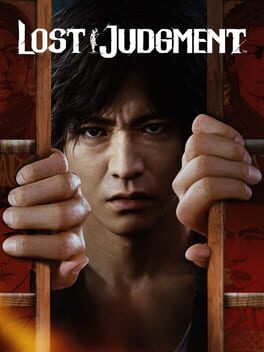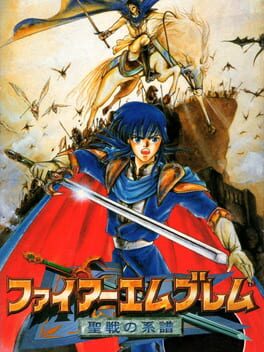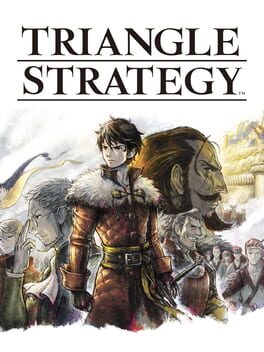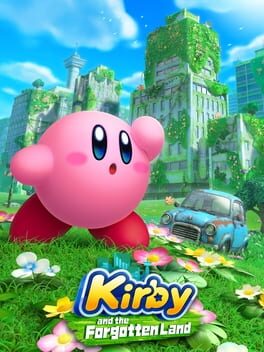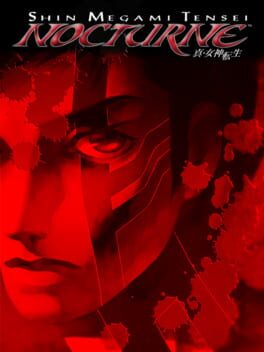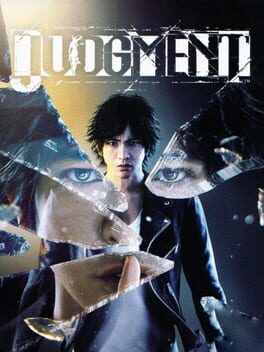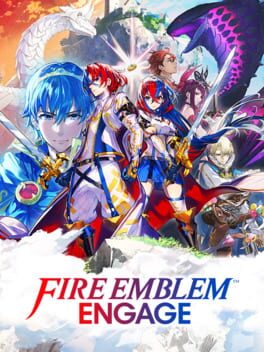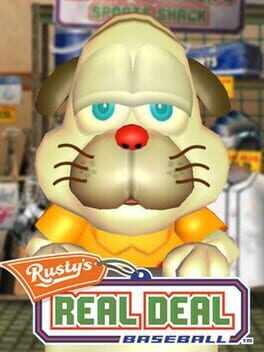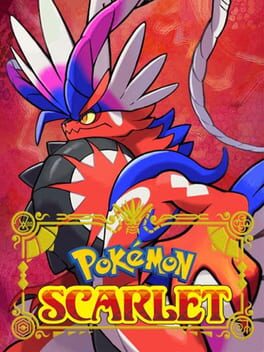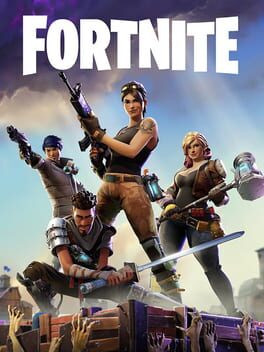GamerJM
2021
Kind of an inverse of Judgment where this has some of the best gameplay in the series but the story is a lot more mid than the first game.
Possibly has some of the most versatile combat in the series. All of the different fighting styles are a blast to play around with, though it doesn't quite feel as frantic as Y6 and some enemy encounters towards the end are a bit annoying. The boxer fighting style specifically is a huge change of pace for this, and it makes you genuinely feel like you're playing some kind of brawler/boxing game hybrid.
This game smooths out a lot of the edges of the first Judgment, to the point where it feels a lot closer to a mainline Yakuza game. The stealth segments are significantly less plentiful, which is great because those really brought down the first game. The chase sequences are also less common as well. You spend less of the playtime doing things like using drones; the investigation sequences are still pretty common, but they're more straightforward and akin to bits in Ace Attorney.
I guess the problem that does come with some of this is that it ends up feeling more forgettable amongst the series. The gameplay here really feels similar to Kiwami 2 in some regards. I guess that's kind of a hard problem for this franchise to overcome but it's still there.
The story is.....hm. The main players and villains feel revealed too early on to grip me the way Judgment's did. I also think it's kind of incoherent thematically since the main bad characters of the game kind of have a point even if they went too far, and what theme I can juice out of it feels like the game is saying that Japanese law needs to be tougher on bullying as a crime, which.....I don't really agree with? I mean bullying is a problem, but the systemic issues that cause it are more rooted in underfunded schools and poor home childhood home life caused by our economic material realities and overworked parents. This game doesn't really go into any of that and sometimes feels like the equivalent of a middle schooler starting an "End Bullying" campaign at their school. But I'm probably reading into this too much; this game clearly went for a soap opera-ass story like a lot of the earlier Yakuza games and isn't thematically as interesting as the first game. And it very much succeeds in this regard! The characters are a lot of fun, it's constantly doing interesting things in its story, the emotional beats hit. I'd describe it as fun but disappointing. The game is still better than the first though, by virtue of just holistically being more fun.
Possibly has some of the most versatile combat in the series. All of the different fighting styles are a blast to play around with, though it doesn't quite feel as frantic as Y6 and some enemy encounters towards the end are a bit annoying. The boxer fighting style specifically is a huge change of pace for this, and it makes you genuinely feel like you're playing some kind of brawler/boxing game hybrid.
This game smooths out a lot of the edges of the first Judgment, to the point where it feels a lot closer to a mainline Yakuza game. The stealth segments are significantly less plentiful, which is great because those really brought down the first game. The chase sequences are also less common as well. You spend less of the playtime doing things like using drones; the investigation sequences are still pretty common, but they're more straightforward and akin to bits in Ace Attorney.
I guess the problem that does come with some of this is that it ends up feeling more forgettable amongst the series. The gameplay here really feels similar to Kiwami 2 in some regards. I guess that's kind of a hard problem for this franchise to overcome but it's still there.
The story is.....hm. The main players and villains feel revealed too early on to grip me the way Judgment's did. I also think it's kind of incoherent thematically since the main bad characters of the game kind of have a point even if they went too far, and what theme I can juice out of it feels like the game is saying that Japanese law needs to be tougher on bullying as a crime, which.....I don't really agree with? I mean bullying is a problem, but the systemic issues that cause it are more rooted in underfunded schools and poor home childhood home life caused by our economic material realities and overworked parents. This game doesn't really go into any of that and sometimes feels like the equivalent of a middle schooler starting an "End Bullying" campaign at their school. But I'm probably reading into this too much; this game clearly went for a soap opera-ass story like a lot of the earlier Yakuza games and isn't thematically as interesting as the first game. And it very much succeeds in this regard! The characters are a lot of fun, it's constantly doing interesting things in its story, the emotional beats hit. I'd describe it as fun but disappointing. The game is still better than the first though, by virtue of just holistically being more fun.
Jesus, this game is.....something else man. The maps are huge, in a way I really don't like. In order to break up the gameplay and not irritate myself I played this game a few times a week for about 30 minutes a night over the course of a year. I ended up having some really memorable experiences with it that way. The skirmishes, when broken down into their pure gameplay, are a lot of fun. This game has a lot of mechanics I appreciate; I love the way the arena works. The fact that you can position units in such a way to have a dancer take care of four on a single turn. The fact that a lot of non-mounted units actually have a pretty big advantage if you're not playing for LTC in terms of their speed, which I quite liked with time.
But it's just....so monotonous sometimes. Some gameplay sessions were literally just moving units. Hell, some gameplay sessions were me RE-MOVING units wherein I load up from an earlier save after I realized I moved my units in a way that wasn't to my liking. It's just....boring.
The plot has interesting ideas but they mostly seemed executed in a way that was sorta basic compared to later games. At least to my understanding, my Japanese isn't great and I didn't play the fan translation.
I realize that some of my issues are because I played this game on original hardware untranslated. But I'm not critiquing Fire Emblem: Genealogy of the Holy War, the game these zoomer FE fans download from some dude on Discord and play on SNES9X with graphical filters or whatever. I'm critiquing Fire Emblem: Seisen No Keifu, the game that a version of myself two decades older might have bought from a local import shop in 1996 (or even maybe an alternate version of myself that got into retro gaming earlier in the mid-late 2000s but is otherwise the same). That game is brilliant in pieces but also pretty frustrating. But it sure looks nice on a CRT. Take that, zoomers.
But it's just....so monotonous sometimes. Some gameplay sessions were literally just moving units. Hell, some gameplay sessions were me RE-MOVING units wherein I load up from an earlier save after I realized I moved my units in a way that wasn't to my liking. It's just....boring.
The plot has interesting ideas but they mostly seemed executed in a way that was sorta basic compared to later games. At least to my understanding, my Japanese isn't great and I didn't play the fan translation.
I realize that some of my issues are because I played this game on original hardware untranslated. But I'm not critiquing Fire Emblem: Genealogy of the Holy War, the game these zoomer FE fans download from some dude on Discord and play on SNES9X with graphical filters or whatever. I'm critiquing Fire Emblem: Seisen No Keifu, the game that a version of myself two decades older might have bought from a local import shop in 1996 (or even maybe an alternate version of myself that got into retro gaming earlier in the mid-late 2000s but is otherwise the same). That game is brilliant in pieces but also pretty frustrating. But it sure looks nice on a CRT. Take that, zoomers.
2022
Live-a-Live is a good game, but it's also a very interesting game, probably more than it is good. I at least respect the parts of this game I don't really like.
I feel like you can sort of break up this game's chapters into two categories: The chapters that play and flow more like traditional JRPGs (Prehistory, Imperial China, the Near Future, and the Middle Ages), and the more experimental ones (Twilight of Edo Japan, the Wild West, Present Day, and the Distant Future). The more traditional chapters are all a pretty good time; paced decently well, okay to good dungeon design, memorable setpieces. They all kind of end up never really reaching their full potential because of their length, though. Something like the Near Future especially feels just kind of like a condensed RPG that can't reach its full potential because it can't develop its characters more fully. I do think their quality varies some; Prehistory is a bit weaker than the others, and the Middle Ages feels more interesting and memorable than the others, but I'd say they're all "pretty good" on their own.
The more experimental chapters are uh....mixed. Edo Japan and the Wild West I think have pretty good execution. but I'm not really big on their concepts to begin with. I'm not super into games designed around learning and remembering stage layouts, nor does a "Metroidvania Stealth Game" sound like something up my alley, so my issues mostly have to do with the types of games those chapters try to be. Present Day, though, fuckin' rules; I love it when games have a pure-combat arc that's just a total riff on wrestling (see chapter 3 of Paper Mario tTYD), and this delivers in spades. It's unfortunately easily the shortest part of the game, but I still had a blast with it. Distant Future, though, I think is honestly a total flop. It's really interesting, and really experimental to make a combat-less dialogue driven mini-RPG, especially for 1993. It feels very indie game-esque. But the writing just isn't good enough to sustain it, and the story is mostly just a subpar riff on Alien. It was interesting to see it done in a game like this but I don't think it really works.
And then there's the ending, which has a cool concept (that was much better fleshed out in FF6), but ultimately ends up feeling kinda grindy and repetitive. The bonus dungeons each character has feel sorta tedious and bullshit in terms of how they're designed; they're not hard at all, but the friction that exists doesn't feel well designed. The actual final dungeon and encounter, though, rules and brings this thing to a pretty memorable end.
Overall, it seems like a mixed bag, but I liked more of it than I didn't, really. And the parts that I didn't like were at least memorable.
I also have to mention the combat system, which totally owns. Chrono Trigger was 100% a step back from this. The fact that it's grid based forces you to consider positioning a lot more, and the abilities are varied enough to have niche utility in different situations, even if they're not super well balanced across the board (some characters end up being way more useful than others). If nothing else, if you're a fan of RPG boss battles, the ones in this game are worth the price of admission alone.
I feel like you can sort of break up this game's chapters into two categories: The chapters that play and flow more like traditional JRPGs (Prehistory, Imperial China, the Near Future, and the Middle Ages), and the more experimental ones (Twilight of Edo Japan, the Wild West, Present Day, and the Distant Future). The more traditional chapters are all a pretty good time; paced decently well, okay to good dungeon design, memorable setpieces. They all kind of end up never really reaching their full potential because of their length, though. Something like the Near Future especially feels just kind of like a condensed RPG that can't reach its full potential because it can't develop its characters more fully. I do think their quality varies some; Prehistory is a bit weaker than the others, and the Middle Ages feels more interesting and memorable than the others, but I'd say they're all "pretty good" on their own.
The more experimental chapters are uh....mixed. Edo Japan and the Wild West I think have pretty good execution. but I'm not really big on their concepts to begin with. I'm not super into games designed around learning and remembering stage layouts, nor does a "Metroidvania Stealth Game" sound like something up my alley, so my issues mostly have to do with the types of games those chapters try to be. Present Day, though, fuckin' rules; I love it when games have a pure-combat arc that's just a total riff on wrestling (see chapter 3 of Paper Mario tTYD), and this delivers in spades. It's unfortunately easily the shortest part of the game, but I still had a blast with it. Distant Future, though, I think is honestly a total flop. It's really interesting, and really experimental to make a combat-less dialogue driven mini-RPG, especially for 1993. It feels very indie game-esque. But the writing just isn't good enough to sustain it, and the story is mostly just a subpar riff on Alien. It was interesting to see it done in a game like this but I don't think it really works.
And then there's the ending, which has a cool concept (that was much better fleshed out in FF6), but ultimately ends up feeling kinda grindy and repetitive. The bonus dungeons each character has feel sorta tedious and bullshit in terms of how they're designed; they're not hard at all, but the friction that exists doesn't feel well designed. The actual final dungeon and encounter, though, rules and brings this thing to a pretty memorable end.
Overall, it seems like a mixed bag, but I liked more of it than I didn't, really. And the parts that I didn't like were at least memorable.
I also have to mention the combat system, which totally owns. Chrono Trigger was 100% a step back from this. The fact that it's grid based forces you to consider positioning a lot more, and the abilities are varied enough to have niche utility in different situations, even if they're not super well balanced across the board (some characters end up being way more useful than others). If nothing else, if you're a fan of RPG boss battles, the ones in this game are worth the price of admission alone.
2022
Hits the perfect middleground between the more serious high fantasy fare of stuff like FFT and Tactics Ogre, and the focus on customizability and malleable RPG mechanics that the FFTA games had. Feels like your decisions genuinely matter and impact the story here. Also really feels like positioning and direction facing is balanced to matter a lot more here than in its sister titles, which is an adjustment I had a lot of fun with.
I think the most genius game design decision here, though, is to save EXP and levels gained from failed attempts at chapters. The game is, in response, balanced such that you'll easily become underleveled if you don't die much and if you don't do the optional challenges, but if you die enough times the game will be clearable for most anyone. I love it. It allowed me to have a fun, constantly exciting time with this, and I also know that my 10 year old self wouldn't have been stuck at one of the later chapters for hours and hours on end before restarting the game entirely because it would have gotten easier with each subsequent attempt.
The game ultimately starts to get slower and more monotonous towards the end, unfortunately, though. Well, kinda. I actually realized that this isn't as big of a problem as I initially thought when I reached the final boss and remembered that it has the option to speed through animations which makes that much less of an issue. So it's probably still a bit of an issue, but really what happened is that my dumbass sat through hours of repeated battle animations for no reason. Ah well!
I think the most genius game design decision here, though, is to save EXP and levels gained from failed attempts at chapters. The game is, in response, balanced such that you'll easily become underleveled if you don't die much and if you don't do the optional challenges, but if you die enough times the game will be clearable for most anyone. I love it. It allowed me to have a fun, constantly exciting time with this, and I also know that my 10 year old self wouldn't have been stuck at one of the later chapters for hours and hours on end before restarting the game entirely because it would have gotten easier with each subsequent attempt.
The game ultimately starts to get slower and more monotonous towards the end, unfortunately, though. Well, kinda. I actually realized that this isn't as big of a problem as I initially thought when I reached the final boss and remembered that it has the option to speed through animations which makes that much less of an issue. So it's probably still a bit of an issue, but really what happened is that my dumbass sat through hours of repeated battle animations for no reason. Ah well!
I waited over two decades for Kirby to finally make the transition to 3D, something I've anticipated and expected to happen since Kirby 64, and the result is....a very standard Kirby game that feels very similar to the last few. The Super Mario 3D World of Kirby games and even that might be overselling it.
But still, it's a Kirby game, and that means it's quite fun! Just a fun, breezy lil game with a tighter emphasis on collectables than normal. The mouthfuls also introduce fun little gimmicks that do a lot to spruce up the gameplay. The game also just feels nice to play; HAL got the transition to 3D nailed down at least. The level design is mostly just fine.
But still, it's a Kirby game, and that means it's quite fun! Just a fun, breezy lil game with a tighter emphasis on collectables than normal. The mouthfuls also introduce fun little gimmicks that do a lot to spruce up the gameplay. The game also just feels nice to play; HAL got the transition to 3D nailed down at least. The level design is mostly just fine.
What a surprise, the MegaTen game that launched the series into being a cult classic thing in the US and has been universally praised in JRPG circles for the last 20 years lived up to the hype and kicks total ass.
This is a direct upgrade from SMT4 in basically every way, so much so that this could have been sold to me as the game that came after and I would have believed it. Better demon recruiting systems, better overworld, better presentation, better dungeon design. This is still to this day basically the ideal and quintessential SMT game, not my favorite but the one that the series should probably strive to be more like.
Some really fun boss encounters, those last two at the end were absolutely wonderful. Has a pretty reasonable difficulty curve aside from a couple moments, to the point where I actually think this is still a good entry point into the series.
Only downside is that the story is kinda basic I guess. It does what it sets out to do, it just doesn't set out to do a whole lot.
This is a direct upgrade from SMT4 in basically every way, so much so that this could have been sold to me as the game that came after and I would have believed it. Better demon recruiting systems, better overworld, better presentation, better dungeon design. This is still to this day basically the ideal and quintessential SMT game, not my favorite but the one that the series should probably strive to be more like.
Some really fun boss encounters, those last two at the end were absolutely wonderful. Has a pretty reasonable difficulty curve aside from a couple moments, to the point where I actually think this is still a good entry point into the series.
Only downside is that the story is kinda basic I guess. It does what it sets out to do, it just doesn't set out to do a whole lot.
2000
Final Fantasy IX is slow, and I don't just mean in terms of combat. Everything about this game is slow; moving around towns and the overworld, the story, just how long this thing takes to get going and how much time it feels like is spent between major story beats. I know modern rereleases speed things up, but I played the original PS1 version because I adore its aesthetic and the rereleases look gross to me (late era PS1 > high end mobile game aesthetic, always).
The story also isn't a whole lot to write home about. Most of the cast is mostly unlikable sans Vivi. Zidane especially is a real creep towards women and never feels like he gets better over the course of the game.
This also just feels like an overcorrection to FF8; that game was packed full of systems like junctioning, drawing, and Guardian Force collecting. Not all of it worked; to about 60% of the playerbase it was probably impenetrable, 25% probably found ways to easily exploit it, and then the remaining 15% probably played it sorta close to "correctly". But the way these systems interacted with each other was really ambitious and fun to figure out.
FF9 pulls things far back, and is the least mechanically involved game in the series since 4. All that's really there are abilities you can learn from equipment, which doesn't take a whole lot of thought and is pretty automated. I liked how basic FF4 was, but mostly because it had excellent pacing and fun combat and story which this game lacks. The abilities system is something you'll have to consider at the very end of the game; the final boss has an attack called Grand Cross which can inflict basically every status move on you, and you'll need to have at least some abilities equipped in order to negate this effect to not have the fight be damn near impossible. This is a cool way to force the player to consider abilities, but I think the fact that it only comes up once at the very end of the game is not very good game design.
Despite this, I like the game (I operate at thee stars being "good," so I have more room to consider how good games are since I don't play a lot of bad games). But why is that? Well, it's all about that atmosphere, baby. This game feels like a chill breeze on a Sunday morning. The audiovisual world it creates is tremendous. The slow combat is something you can ease yourself into and just kind of sit back and enjoy. Prior to picking it back up a couple times in the last year or two to finally finish it, I played over half of this game during 2022 trips and vacations; on a car trip to see my sister graduate college, at an AirBNB by the beach, on a train to visit a friend. I think it'll always intrinsically be linked to those experiences to me, and it's the perfect trip game. Something you can play passively and enjoy the sights and sounds while having conversations with others with you in your vicinity.
It's also a pretty solid and competently designed. Like, aside from maybe the final boss everything felt fairly fair and balanced.
The story also isn't a whole lot to write home about. Most of the cast is mostly unlikable sans Vivi. Zidane especially is a real creep towards women and never feels like he gets better over the course of the game.
This also just feels like an overcorrection to FF8; that game was packed full of systems like junctioning, drawing, and Guardian Force collecting. Not all of it worked; to about 60% of the playerbase it was probably impenetrable, 25% probably found ways to easily exploit it, and then the remaining 15% probably played it sorta close to "correctly". But the way these systems interacted with each other was really ambitious and fun to figure out.
FF9 pulls things far back, and is the least mechanically involved game in the series since 4. All that's really there are abilities you can learn from equipment, which doesn't take a whole lot of thought and is pretty automated. I liked how basic FF4 was, but mostly because it had excellent pacing and fun combat and story which this game lacks. The abilities system is something you'll have to consider at the very end of the game; the final boss has an attack called Grand Cross which can inflict basically every status move on you, and you'll need to have at least some abilities equipped in order to negate this effect to not have the fight be damn near impossible. This is a cool way to force the player to consider abilities, but I think the fact that it only comes up once at the very end of the game is not very good game design.
Despite this, I like the game (I operate at thee stars being "good," so I have more room to consider how good games are since I don't play a lot of bad games). But why is that? Well, it's all about that atmosphere, baby. This game feels like a chill breeze on a Sunday morning. The audiovisual world it creates is tremendous. The slow combat is something you can ease yourself into and just kind of sit back and enjoy. Prior to picking it back up a couple times in the last year or two to finally finish it, I played over half of this game during 2022 trips and vacations; on a car trip to see my sister graduate college, at an AirBNB by the beach, on a train to visit a friend. I think it'll always intrinsically be linked to those experiences to me, and it's the perfect trip game. Something you can play passively and enjoy the sights and sounds while having conversations with others with you in your vicinity.
It's also a pretty solid and competently designed. Like, aside from maybe the final boss everything felt fairly fair and balanced.
2018
This review contains spoilers
The combat is a step above Kiwami 2, and the story gets really good at the end. I especially like the idea of a corrupt pharma company that operates in immoral ways, with cooperation from the government, all driven by a scientist mad with power. I like how it touches upon the ways in which society looks down upon gang members from the supposed "dregs" of society, and the ways in which governments will do anything to chase success on the global scale. All while being a pretty compelling detective story.
And the combat is fast, frantic, and mostly pretty well balanced. Definitely one of the speedier games in the series. The perma-damage mechanic is super bullshit though, never hard to deal with but just annoying. I'd purposefully die on certain fights after getting hit to not have to waste a health pack on one afterwards.
My main issue with this game, though, is that basically everything it does to make it stand out from the Yakuza games in terms of gameplay is for the worse. Bad forced stealth sections, some late in the game had downright confusing map layouts. Investigation sequences that might as well be cutscenes with how easy the player interaction is. More chase sequences which are basically just QTEfests. Drones are....mostly okay but don't really feel like they add anything. A more trimmed down and combat-focused version of this would have been an all-timer and an easy second favorite in the series, as is it's middle of the road.
And the combat is fast, frantic, and mostly pretty well balanced. Definitely one of the speedier games in the series. The perma-damage mechanic is super bullshit though, never hard to deal with but just annoying. I'd purposefully die on certain fights after getting hit to not have to waste a health pack on one afterwards.
My main issue with this game, though, is that basically everything it does to make it stand out from the Yakuza games in terms of gameplay is for the worse. Bad forced stealth sections, some late in the game had downright confusing map layouts. Investigation sequences that might as well be cutscenes with how easy the player interaction is. More chase sequences which are basically just QTEfests. Drones are....mostly okay but don't really feel like they add anything. A more trimmed down and combat-focused version of this would have been an all-timer and an easy second favorite in the series, as is it's middle of the road.
2023
Pretty mid-tier Fire Emblem, but a mid-tier Fire Emblem is going to be one of the best games of any given year. I've seen people make a big fuss about how bad this game's story is, and it's certainly......not good. Very children's cartoon-esque, and really the game is too long to justify it being around for so long, like there are clearly points where the story is pushing itself to be relevant. But what's more apparent to me than the story coming off Three Houses is how unbalanced this game is. Infinite reclassing and infinite grinding a la Awakening are back, and some units are very obviously pretty broken. This definitely hurts Engage like, as a strategy game.
That being said, this game is basically the pinnacle of "junk food" Fire Emblem. It's not something you have to think deep about on the lower difficulties, and it's not something with a story for like, adults, but damn is it fun to play around with and break. By the end of the game, your units will probably be so powerful that they'll feel like superheroes. The minigames and home base activities are a lot of fun even if they don't mean anything. The engage rings offer a ton of additional customization and player freedom. Fire Emblem really has just never offered anywhere close to this much unit customization. The rewind system here is also super generous, which adds to this game's "junk food"-like quality.
The maps here slap too. I really appreciate how small they are, it makes this perfect for bite sized gameplay. Sans Conquest, probably the best since....New Mystery or Path of Radiance I guess? They're just full of fun little gimmicks and never feel unfair.
Not a fan of the art style at first, but it did somewhat grow on my by the end. Unfortunately a downgrade from how Three Houses looks, which isn't the only attribute I'd say about this game, but it is fun in its own right.
That being said, this game is basically the pinnacle of "junk food" Fire Emblem. It's not something you have to think deep about on the lower difficulties, and it's not something with a story for like, adults, but damn is it fun to play around with and break. By the end of the game, your units will probably be so powerful that they'll feel like superheroes. The minigames and home base activities are a lot of fun even if they don't mean anything. The engage rings offer a ton of additional customization and player freedom. Fire Emblem really has just never offered anywhere close to this much unit customization. The rewind system here is also super generous, which adds to this game's "junk food"-like quality.
The maps here slap too. I really appreciate how small they are, it makes this perfect for bite sized gameplay. Sans Conquest, probably the best since....New Mystery or Path of Radiance I guess? They're just full of fun little gimmicks and never feel unfair.
Not a fan of the art style at first, but it did somewhat grow on my by the end. Unfortunately a downgrade from how Three Houses looks, which isn't the only attribute I'd say about this game, but it is fun in its own right.
The haggling is more of a gimmick than you'd probably expect (the game really doesn't feel like it expects you to pay full price, though it's designed in such a way that I'm sure some unwitting kids certainly did), and doesn't add that much to this. The game kinda cheaps out on Rusty having any kind of an actual tragic background too.
But! The baseball minigames are actually a lot of fun! Think WarioWare meets Wii Sports or something. Lots of twitch reflexes, specifically with baseball visual cues. They're surprisingly kinda difficult too, or at least some of them! Shame the motion controlled ones don't work too well on a handheld, but like, they nailed the feel and the timing windows here.
But! The baseball minigames are actually a lot of fun! Think WarioWare meets Wii Sports or something. Lots of twitch reflexes, specifically with baseball visual cues. They're surprisingly kinda difficult too, or at least some of them! Shame the motion controlled ones don't work too well on a handheld, but like, they nailed the feel and the timing windows here.
2022
Impressions 1 hour in: Wow, this performance is terrible.
Impressions 15 hours in: Okay now that I'm used to the bad performance this is kind of awesome.
Impressions 45 hours in: Okay, actually this game ends up getting pretty repetitive after a while though it's still a ton of fun.
If Game Freak were a more technically competent developer, this would be heralded as Pokemon's Breath of the Wild moment, I think. The world is vibrant and chalk full of stuff to explore, and dare I say even bloated at time. I still ended up kind of loving this, just off the strength of Pokemon combat alone. Which is as strong as ever here. 65 hours of strategizing and statistical analysis that kids can to sure is fun to me, and I mean that completely unironically. It's just the perfect thing for my brain to unwind with. The most ambitious Pokemon game....ever, and while that ambition doesn't always pay off, I'd take that over whatever the hell Sword and Shield is any day of the week.
Impressions 15 hours in: Okay now that I'm used to the bad performance this is kind of awesome.
Impressions 45 hours in: Okay, actually this game ends up getting pretty repetitive after a while though it's still a ton of fun.
If Game Freak were a more technically competent developer, this would be heralded as Pokemon's Breath of the Wild moment, I think. The world is vibrant and chalk full of stuff to explore, and dare I say even bloated at time. I still ended up kind of loving this, just off the strength of Pokemon combat alone. Which is as strong as ever here. 65 hours of strategizing and statistical analysis that kids can to sure is fun to me, and I mean that completely unironically. It's just the perfect thing for my brain to unwind with. The most ambitious Pokemon game....ever, and while that ambition doesn't always pay off, I'd take that over whatever the hell Sword and Shield is any day of the week.
2017
Unsurprisingly, the dude who didn't get around to playing Fortnite until 2023 doesn't really care for Fortnite, who'da thunk. I inherently find the battle royale format to be obnoxious (the odds of winning are lower and therefore the dopamine associated with it doesn't happen as much, and the length BR demands prevents the games from being pick-up-and-play), but even within that format, Fortnite is pretty far off from what I'd want a game like this to be like. There's so much emphasis on inventory management and a billion different types of weapons and items to track that the game feels less like a shooter and more like a shitty survival game. I played it with some friends which helped, but if you're just getting into this solo, it seems like it'd be an absolutely miserable experience, with so much unexplained esoteric knowledge and facing so many people who are clearly going to be coordinating with one another while you're on your own. The environments are also obnoxiously big which isn't something I like either. And also the raw shooting doesn't feel too great either.
There's not a whole lot I really like about this, though it is admittedly compelling just how big the featureset is now and how many IPs are featured in this. I also think that the aesthetic holds up pretty well in motion too.
There's not a whole lot I really like about this, though it is admittedly compelling just how big the featureset is now and how many IPs are featured in this. I also think that the aesthetic holds up pretty well in motion too.
1995
Chrono Trigger is a good game. Hell, Chrono Trigger is a GREAT game. It has a unique combat system that requires the player to think fast and recognize spatial awareness, while also still building it on the base of the ATB system used in the prior six Final Fantasy games. It has a charming story and some great writing from localization legend Ted Woolsey. It has some of the coolest looking sprite art on the SNES. It has a relatively balanced cast of characters (at least for casual play, I dunno about speedrunning or whatever) and boss design that requires you to think about all of them. And it also has a really damn fantastic soundtrack and sound design.
That being said, I can't help but be at least a little disappointed. Chrono Trigger and Final Fantasy VI are games that were hyped to me in certain circles as basically these god tier JRPGs, the crown jewels in the SNES library, and what all similar games should aspire to be. I didn't expect FF6 to necessarily meet this, so I was shocked when it still kinda sorta did. Chrono Trigger just....doesn't, though. Again, it's a great game, but best game or best RPG ever? Naw. The combat system is great, but you don't have to think about it too much until towards the end, outside of a couple of specific boss fights. Everyone talks about how great the pacing in this is, and I just....don't agree, at all? I actually think the pacing in the first half or so of the game is too quick; you move from time period to time period rapidly, and it feels like you never really get to dwell on these small overworlds. I know a lot of people probably appreciate that in our current climate of slow-as-molasses RPGs, but it just prevents this from feeling like an epic adventure in the same way some of the best FF and DQ games do. There's also a lot of good side content that I think the developers could have just straight up made mandatory, because it's pretty crucial to certain characters and without it the game would probably feel too short.
I do want to emphasize that I liked this a lot. One thing I see people say is that it's a game they can't really find a lot wrong with, and from a surface level design perspective that's certainly true. Chrono Trigger is very much a game that wouldn't really benefit all that much from minor improvements. But I don't think it's better than Final Fantasy IV, VI, Dragon Quest V and VI, or Seiken Densetsu 3. And I think most of those have better pacing.
That being said, I can't help but be at least a little disappointed. Chrono Trigger and Final Fantasy VI are games that were hyped to me in certain circles as basically these god tier JRPGs, the crown jewels in the SNES library, and what all similar games should aspire to be. I didn't expect FF6 to necessarily meet this, so I was shocked when it still kinda sorta did. Chrono Trigger just....doesn't, though. Again, it's a great game, but best game or best RPG ever? Naw. The combat system is great, but you don't have to think about it too much until towards the end, outside of a couple of specific boss fights. Everyone talks about how great the pacing in this is, and I just....don't agree, at all? I actually think the pacing in the first half or so of the game is too quick; you move from time period to time period rapidly, and it feels like you never really get to dwell on these small overworlds. I know a lot of people probably appreciate that in our current climate of slow-as-molasses RPGs, but it just prevents this from feeling like an epic adventure in the same way some of the best FF and DQ games do. There's also a lot of good side content that I think the developers could have just straight up made mandatory, because it's pretty crucial to certain characters and without it the game would probably feel too short.
I do want to emphasize that I liked this a lot. One thing I see people say is that it's a game they can't really find a lot wrong with, and from a surface level design perspective that's certainly true. Chrono Trigger is very much a game that wouldn't really benefit all that much from minor improvements. But I don't think it's better than Final Fantasy IV, VI, Dragon Quest V and VI, or Seiken Densetsu 3. And I think most of those have better pacing.
